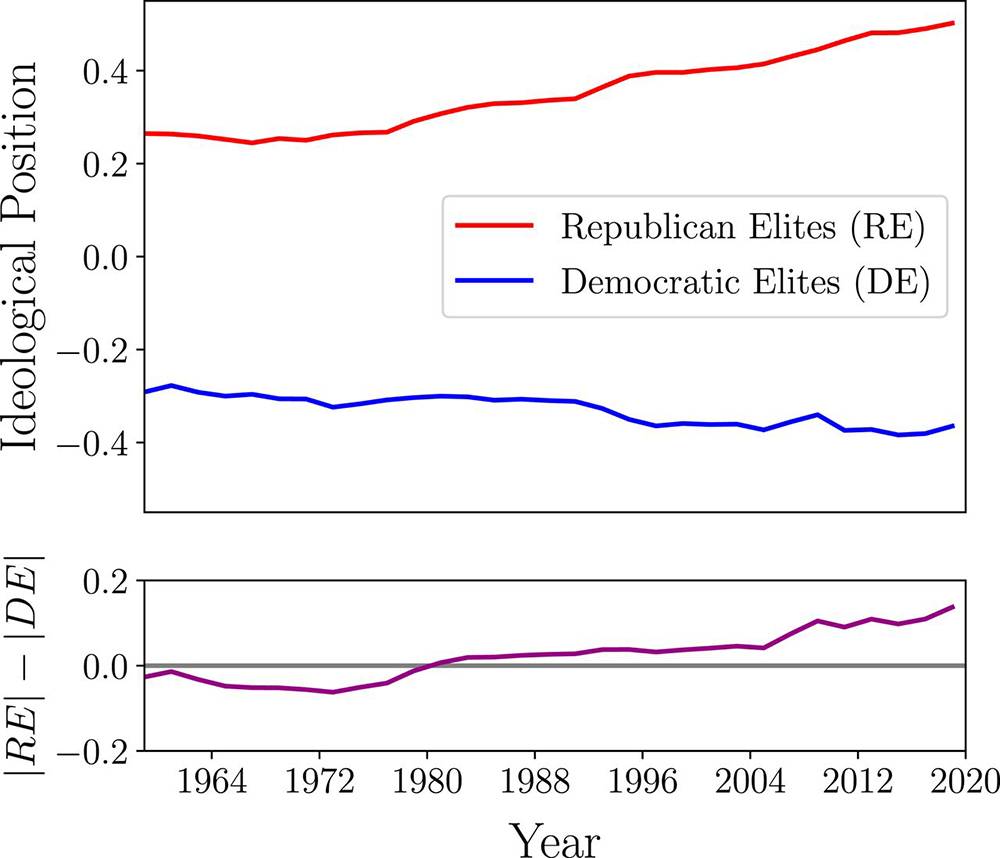 |

|
 |
Any model of elite polarization must offer insight into one of its more notable characteristics: its asymmetry. While elites of both parties have polarized ideologically, the authors used dynamic, weighted, nominal three-step estimation (DW-NOMINATE) scores to illustrate that the process of polarization has been more precipitous for Republicans in the US Congress, yielding a position that is currently more extreme than the Democratic Party. In Fig 1 from the paper, DW-NOMINATE scores (first dimension), as averaged across US Senate and House of Representatives. (Click image for larger view) |
|
New research by an ISR/ECE alum that applies the principles of nonlinear feedback dynamics to the current state of the U.S. political system was recently featured in a New York Times essay by Thomas Edsall, who surveyed a number of recent works on this subject that appeared in the Dec. 14 issue of the Proceedings of the National Academy of Sciences of the United States of America (PNAS).
"The nonlinear feedback dynamics of asymmetric political polarization" was written by alum Naomi Leonard (EE Ph.D. 1994) and Anastasia Bizyeva, both of Princeton University; Keena Lipsitz (CUNY); Alessio Franci (National Autonomous University of Mexico); and Yphtach Lelkes (University of Pennsylvania).
Leonard is the Edwin S. Wilsey Professor of Mechanical and Aerospace Engineering and associated faculty member of the Program in Applied and Computational Mathematics at Princeton. She directs Princeton's Council on Science and Technology and is an affiliated faculty member of the Princeton Neuroscience Institute and Program on Quantitative and Computational Biology. Leonard is a MacArthur Fellow, a member of the American Academy of Arts and Sciences, and a Fellow of the ASME, IEEE, IFAC, and SIAM. At Maryland, Leonard was advised by Professor P. S. Krishnaprasad (ECE/ISR).
Using a general model of opinion dynamics, PNAS research article helps illuminate what is driving political polarization in the U.S., as well as what factors account for its asymmetric nature. In particular, the authors focus on positive feedback among members of Congress as the key mechanism of polarization. They also show how public opinion, which responds to the laws legislators make, in turn drives the feedback dynamics of political elites. Specifically, the authors find that voters’ “policy mood,”—whether public opinion leans in a more liberal or conservative direction—drives asymmetries in elite polarization over time. Their model also demonstrates that once self-reinforcing processes among elites reach a critical threshold, polarization rapidly accelerates. By tying together elite and voter dynamics, the paper presents a unified theory of political polarization.
The model provides researchers with a simple but powerful tool for exploring ways to mitigate, if not reverse, the polarization dynamics in the U.S.
Related Articles:
Workshop honors alum Naomi Leonard
Alum Shinkyu Park wins 2022 O. Hugo Schuck Award
Alum Naomi Leonard is 2023 IEEE Control Systems Award recipient
ECE and ISR alumni feature prominently at American Control Conference
Alum Sean Andersson named Mechanical Engineering Department chair at Boston University
Alumnus Udit Halder’s work published as cover article in Proceedings of The Royal Society A
Alum Marcos Vasconcelos to join FSU faculty this fall
Alum Dipankar Maity joins ECE faculty at University of North Carolina Charlotte
Alumnus Kevin Galloway earns tenure at the U.S. Naval Academy
ISR/ECE alumni collaborate on control paper published in PRS-A
December 15, 2021
|

